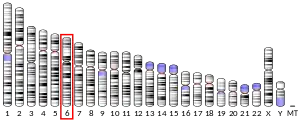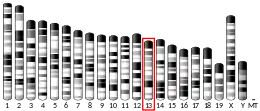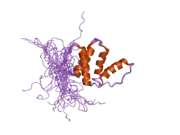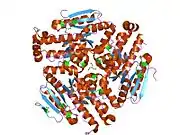PECI (gene)
Peroxisomal 3,2-trans-enoyl-CoA isomerase is an enzyme that in humans is encoded by the PECI gene.[5][6]
| ECI2 | |||||||||||||||||||||||||||||||||||||||||||||||||||
|---|---|---|---|---|---|---|---|---|---|---|---|---|---|---|---|---|---|---|---|---|---|---|---|---|---|---|---|---|---|---|---|---|---|---|---|---|---|---|---|---|---|---|---|---|---|---|---|---|---|---|---|
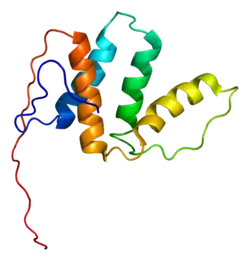 | |||||||||||||||||||||||||||||||||||||||||||||||||||
| |||||||||||||||||||||||||||||||||||||||||||||||||||
| Identifiers | |||||||||||||||||||||||||||||||||||||||||||||||||||
| Aliases | ECI2, ACBD2, DRS-1, DRS1, HCA88, PECI, dJ1013A10.3, enoyl-CoA delta isomerase 2 | ||||||||||||||||||||||||||||||||||||||||||||||||||
| External IDs | OMIM: 608024 MGI: 1346064 HomoloGene: 38145 GeneCards: ECI2 | ||||||||||||||||||||||||||||||||||||||||||||||||||
| |||||||||||||||||||||||||||||||||||||||||||||||||||
| |||||||||||||||||||||||||||||||||||||||||||||||||||
| |||||||||||||||||||||||||||||||||||||||||||||||||||
| |||||||||||||||||||||||||||||||||||||||||||||||||||
| |||||||||||||||||||||||||||||||||||||||||||||||||||
| Wikidata | |||||||||||||||||||||||||||||||||||||||||||||||||||
| |||||||||||||||||||||||||||||||||||||||||||||||||||
PECI is an auxiliary enzyme that catalyzes an isomerization step required for the beta-oxidation of unsaturated fatty acids.[supplied by OMIM][6]
References
- GRCh38: Ensembl release 89: ENSG00000198721 - Ensembl, May 2017
- GRCm38: Ensembl release 89: ENSMUSG00000021417 - Ensembl, May 2017
- "Human PubMed Reference:". National Center for Biotechnology Information, U.S. National Library of Medicine.
- "Mouse PubMed Reference:". National Center for Biotechnology Information, U.S. National Library of Medicine.
- Geisbrecht BV, Zhang D, Schulz H, Gould SJ (Aug 1999). "Characterization of PECI, a novel monofunctional Delta(3), Delta(2)-enoyl-CoA isomerase of mammalian peroxisomes". J Biol Chem. 274 (31): 21797–803. doi:10.1074/jbc.274.31.21797. PMID 10419495.
- "Entrez Gene: PECI peroxisomal D3,D2-enoyl-CoA isomerase".
Further reading
- Maruyama K, Sugano S (1994). "Oligo-capping: a simple method to replace the cap structure of eukaryotic mRNAs with oligoribonucleotides". Gene. 138 (1–2): 171–4. doi:10.1016/0378-1119(94)90802-8. PMID 8125298.
- Suzuki Y, Yoshitomo-Nakagawa K, Maruyama K, et al. (1997). "Construction and characterization of a full length-enriched and a 5'-end-enriched cDNA library". Gene. 200 (1–2): 149–56. doi:10.1016/S0378-1119(97)00411-3. PMID 9373149.
- Suk K, Kim YH, Hwang DY, et al. (1999). "Molecular cloning and expression of a novel human cDNA related to the diazepam binding inhibitor". Biochim. Biophys. Acta. 1454 (1): 126–31. doi:10.1016/s0925-4439(99)00033-2. PMID 10354522.
- Scanlan MJ, Gordan JD, Williamson B, et al. (1999). "Antigens recognized by autologous antibody in patients with renal-cell carcinoma". Int. J. Cancer. 83 (4): 456–64. doi:10.1002/(SICI)1097-0215(19991112)83:4<456::AID-IJC4>3.0.CO;2-5. PMID 10508479.
- Wiemann S, Weil B, Wellenreuther R, et al. (2001). "Toward a catalog of human genes and proteins: sequencing and analysis of 500 novel complete protein coding human cDNAs". Genome Res. 11 (3): 422–35. doi:10.1101/gr.GR1547R. PMC 311072. PMID 11230166.
- Simpson JC, Wellenreuther R, Poustka A, et al. (2001). "Systematic subcellular localization of novel proteins identified by large-scale cDNA sequencing". EMBO Rep. 1 (3): 287–92. doi:10.1093/embo-reports/kvd058. PMC 1083732. PMID 11256614.
- Suzuki Y, Tsunoda T, Sese J, et al. (2001). "Identification and characterization of the potential promoter regions of 1031 kinds of human genes". Genome Res. 11 (5): 677–84. doi:10.1101/gr.gr-1640r. PMC 311086. PMID 11337467.
- Janssen U, Stoffel W (2002). "Disruption of mitochondrial beta -oxidation of unsaturated fatty acids in the 3,2-trans-enoyl-CoA isomerase-deficient mouse". J. Biol. Chem. 277 (22): 19579–84. doi:10.1074/jbc.M110993200. PMID 11916962.
- Wang Y, Han KJ, Pang XW, et al. (2002). "Large scale identification of human hepatocellular carcinoma-associated antigens by autoantibodies". J. Immunol. 169 (2): 1102–9. doi:10.4049/jimmunol.169.2.1102. PMID 12097419.
- Strausberg RL, Feingold EA, Grouse LH, et al. (2003). "Generation and initial analysis of more than 15,000 full-length human and mouse cDNA sequences". Proc. Natl. Acad. Sci. U.S.A. 99 (26): 16899–903. Bibcode:2002PNAS...9916899M. doi:10.1073/pnas.242603899. PMC 139241. PMID 12477932.
- Mungall AJ, Palmer SA, Sims SK, et al. (2003). "The DNA sequence and analysis of human chromosome 6". Nature. 425 (6960): 805–11. Bibcode:2003Natur.425..805M. doi:10.1038/nature02055. PMID 14574404.
- Ota T, Suzuki Y, Nishikawa T, et al. (2004). "Complete sequencing and characterization of 21,243 full-length human cDNAs". Nat. Genet. 36 (1): 40–5. doi:10.1038/ng1285. PMID 14702039.
- Feng X, Chuhjo T, Sugimori C, et al. (2004). "Diazepam-binding inhibitor-related protein 1: a candidate autoantigen in acquired aplastic anemia patients harboring a minor population of paroxysmal nocturnal hemoglobinuria-type cells". Blood. 104 (8): 2425–31. doi:10.1182/blood-2004-05-1839. PMID 15217832.
- Gerhard DS, Wagner L, Feingold EA, et al. (2004). "The status, quality, and expansion of the NIH full-length cDNA project: the Mammalian Gene Collection (MGC)". Genome Res. 14 (10B): 2121–7. doi:10.1101/gr.2596504. PMC 528928. PMID 15489334.
This article is issued from Wikipedia. The text is licensed under Creative Commons - Attribution - Sharealike. Additional terms may apply for the media files.
